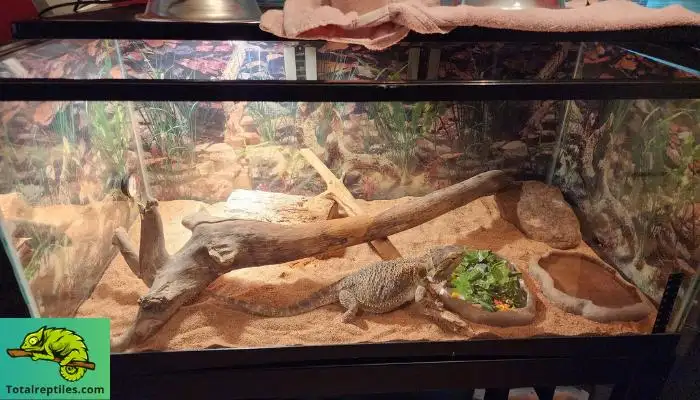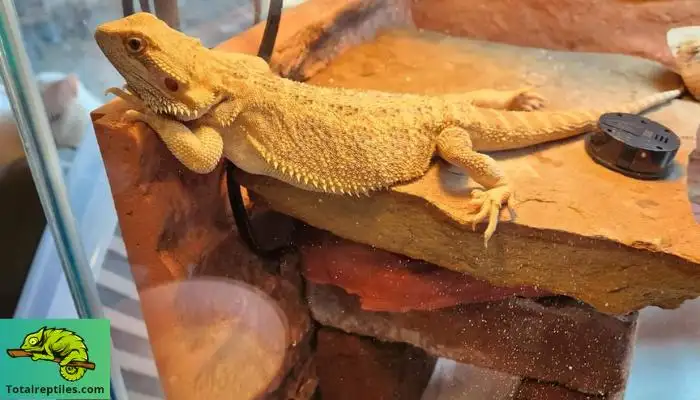Are you considering getting yourself a proper bearded dragon enclosure? In that case, you might be conflicted about whether or not you should install a special kind of light, such as UVB. So, do bearded dragons need UVB?
Bearded dragons do need UVB to stay healthy. The UVB light helps to regulate the production of Vitamin D3, enabling them to absorb and use calcium. And low UVB light exposure can lead to metabolic bone disease and paralysis.
Now, you might be wondering whether there are any side effects of UVB lights. That is, can bearded dragons get to high amounts of UVB? If so, how much UVB does a bearded dragon need? You will find all the answers below.

Do Bearded Dragons Need UVB?
As discussed earlier, bearded dragons require UVB to remain healthy. This light ensures that the production of Vitamin D3 level is optimal within the skin. That means the Vitamin D3 level will be very shallow when exposure to UVB is low.
Now, when bearded dragons can not produce enough Vitamin D3, their bodies will be incapable of absorbing and properly utilizing calcium. In other words, low Vitamin D3 will also make the calcium levels within the body fall.
With the deficiency of vitamin D3 and calcium, the reptile will face a lot of different health issues. That includes deformities within the body, muscle wastage, and bone diseases.
So, even if you are torn about using red light in the bearded dragon enclosure, you can not skip the UVB light.
Why Do Bearded Dragons Need UVB Light?
To fully understand the importance of UVB light in bearded dragons, you have to look into their natural habitat. So, bearded dragons get ultraviolet light and heat directly from the sun in natural settings.

When basking in the sun, the UVB light heats their body up and helps them synthesize Vitamin D3. That eventually leads them to regulate bone health, maintain muscle health, and prevent metabolic diseases.
That said, for pet reptiles, it might not be possible to get the UVB light directly from the sun. And while the sun is known for offering a full spectrum of UV lights, you can replicate the beneficial effect using artificial lights.
For example, mercury vapor bulbs, halogen bulbs, ceramic bulbs, and incandescent electric lighting bulbs can offer bearded dragons the UVB they need.
Are Coil UVB Bulbs Bad for Bearded Dragons?
Coil UVB bulbs are not recommended for bearded dragons. Wondering why? Unlike other UVB bulbs, coil UVB lights do not emit the right wavelengths to offer health benefits. The wavelengths produced can even cause different health issues.
As you know, bearded dragons require UVB lighting to maintain their overall health. So, when they are not getting the right UVB light, you will notice their health deteriorate.
The optimal UVI gradient for bearded dragons is 0 to 4.0-6.0. This range is from the furthest area from the bulb to the basking area. And if you have a normally pigmented bearded dragon, it can tolerate a UVI gradient of up to 7.0.
Opt for linear fluorescent UVB bulbs if you cannot access ceramic, halogen, mercury vapor, or incandescent bulbs. They might not be able to offer heat to the bearded dragons. But fluorescent UVB bulbs can deliver the right level of UVB.
How Much UVB Does a Bearded Dragon Need?
UVB light is basically essential for bearded dragons. And in natural settings, these reptiles generally get UVB during the entire day. So, if you want to emulate the most natural environment for them, provide UVB during the natural daylight hours.

In other words, bearded dragons should be able to access UVB from 10 to 14 hours daily. UVB exposure will be more than enough to make their body maintain bone and muscle health.
In case you were wondering, during the winter period, they will need less amount of UVB during the day. Around 10 hours of exposure should be enough. On the other hand, for summer, ensure they are getting about 14 hours of UVB.
READ MORE: Do Bearded Dragons Need Heat At Night?
Can Bearded Dragons Get Too Much UVB?
No matter what, you should not keep bearded dragons exposed to UVB light all the time. Generally, bearded dragons will go through a self-regulation process and seek out UVB when required. However, overexposure can happen when they are spending too much time near UVB light.
Now, overexposure to UVB can severely impact the overall health of bearded dragons. Among the side effects are photo-kerato-conjunctivitis, hypercalcemia, hyperparathyroidism, and hyperkeratosis.
Moreover, low-quality lights can emit too much UVB than required. That will eventually end up overheating the tank. This scenario can also happen with good-quality lights. That’s why keeping hiding or cooling zones in the tank is essential.
In addition, you should monitor their time in the basking zone. Remember, the key to a happy and thriving bearded dragon is to offer them a setting that is as close to the natural environment as possible.
How Many Watt UVB for Bearded Dragon?
Bearded dragons require a full spectrum of UV light to remain healthy. But as mentioned earlier, you can get away with artificial light. And when it comes to choosing an artificial UVB bulb, it’s quite important to check the wattage.

That said, to determine the right wattage level, you should first consider the size of the tank. Put the distance between the basking spot and bulb into the equation. Afterward, select a bulb that can cover 2/3 or 3/4 of the whole tank.
Typically, 90-watt to 100-watt bulbs at 20 inches offer the right level of heat and UVB to bearded dragons. If the 3/4 or 2/3 part of your tank is more than 20 inches in size, you should opt for a bulb that’s higher than 100 watts.
How Long Can a Bearded Dragon Go Without UVB?
UVB is an essential thing for bearded dragons. So, when they are kept away from getting exposure to light for too long, they will gradually develop different health issues. In some cases, the side effects can be fatal.
Nonetheless, bearded dragons can last for only two days without getting any UVB light. Afterward, the Vitamin D3 and calcium level inside their body decreases massively, leading to fatal consequences.
Final Words
So, do bearded dragons need UVB? In short, bearded dragons require UVB to maintain their health and stay physically fit. There can be fatal side effects without getting the right level of UVB exposure. And the same thing applies to overexposure.
For that reason, you should closely monitor how often the bearded dragon is basking near the UVB light or in the sun.

